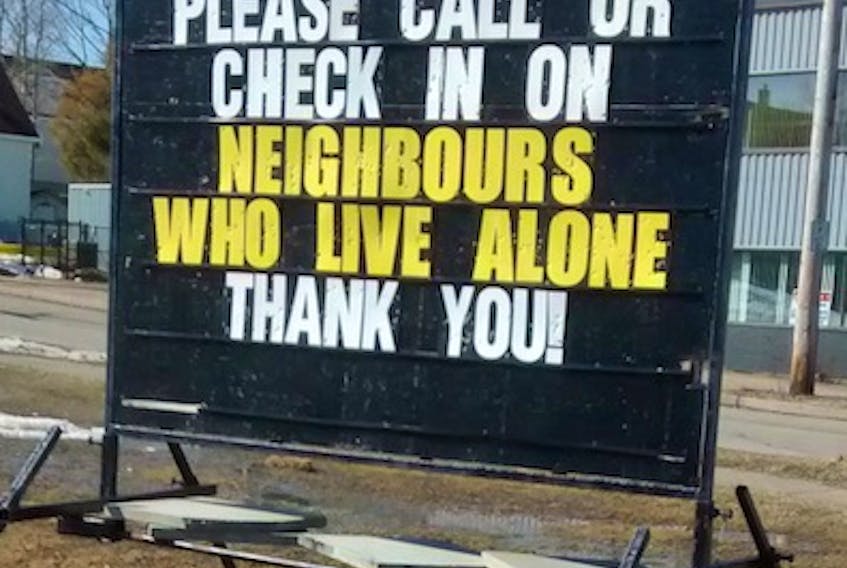I hope you and your family are doing well during these difficult times. Sincere thanks to fellow Cape Bretoners who are working in front-line occupations. Kudos to everyone who is finding creative ways to help neighbours, check on vulnerable people and stay connected while respecting the state of emergency and maintaining social distancing. Thank you for caring amidst all the worry of what the future will bring.
Getting through the COVID-19 crisis is now a marathon and not a sprint. As a community, we’re not fully prepared for the long haul. And after the crisis abates, large parts of Cape Breton’s previously fragile economy will struggle to bounce back.

In the coming days and weeks, we will need better coordination of local services.
Several volunteer organizations are picking up groceries and prescriptions for seniors and others who are at higher medical risk. Local governments can be very helpful here by matching need with volunteers, and by coordinating volunteer services through a central number.
The Cape Breton Regional Municipality’s sister city in Poland, Walbrzych, is doing this to good effect.
Walbrzych also has a hotline to easily access mental health support, not just for emergencies but for occasional reassurance and advice.
If these were normal times, Charlotte Powell, coordinator of the Attic Project for the Welsh agency Care and Repair Cymru, would have been here this week as an educational visitor, hosted by Cape Breton University’s Tompkins Institute.
She works with seniors who live alone. These days, she is plugged into her local authority’s neighbourhood-by-neighbourhood network of volunteers who call up seniors and vulnerable people and also make deliveries. Local governments in Wales have stepped up to coordinate the various community organizations.
As the weeks drag on, I am very concerned about people living in abusive situations. Our region will need easy access to alternative accommodations, including some hotels.
Many Cape Bretoners live in houses that are in poor condition – mouldy, structurally unsound, at serious risk of fire, with broken or non-existent appliances.
Sitting inside such homes for weeks is risky – without the relief of coffee shops, other homes to visit or safe hangout locations. The sociologist Ray Oldenburg calls these “third places.” A lot of people rely on them for informal support. Again, we will need to set up some alternative accommodations.
Children and youth can be creative and resilient, and they are getting by partly through online connections.
Virtual community centres — and familiar local teachers and librarians offering a positive program — are important at this time. This includes fun problem-solving, crafts, reading and invigorating recreational projects. I hope we can expand on the great work of some of our valued librarians and educators, and even get tablets and internet access to homes that don’t have them.
Without very creative leadership, Cape Breton will be economically stagnant after businesses and places of assembly start to re-open. Sadly, many small businesses will not survive this crisis, despite last week’s $107-billion federal stimulus package.
Community halls and places of faith that anchor communities will be in a tough situation, as will independently owned (non-big-box) shops and restaurants.
The cruise-ship industry will never return to its previous heights.
Once the immediate crisis is over, we will have to do some serious thinking about creating an economy here that relies more on local ingenuity, local supply chains and local production. Coal barons and crammed cruise ships are not going to rescue us.
Children and youth can be creative and resilient, and they are getting by partly through online connections.
But there will be hope of attracting additional remote or self-employed workers who choose to settle here and work from home or small shops. Much of the world is getting accustomed these days to working remotely. Tranquil, community-oriented places like ours will get a second look.
Finally, a few words about the “tone at the top.” In the weeks ahead, we will need local leaders to be more visible. Morale matters when we’re in a marathon.
And for those of us who are heeding the COVID-19 restrictions (as opposed to the “reckless few”), Premier Stephen McNeil will have to come across as warmer. I acknowledge the stress he is under, but the daily scowls and scoldings will soon start to sap morale.
Contrast this approach with that of Quebec Premier François Legault, who manages to deliver the same grave, clear messages and instructions with a spirit of solidarity, gratitude and friendship. His “remerciements du jour” (thanks of the day), in which he singles out different people who are going above and beyond, have an uplifting tone.
Leadership is often about giving a lift to people who are stressed or hurting. And that describes many of our people right now.
Dr. Tom Urbaniak is a professor of political science at Cape Breton University. He can be reached at [email protected].








